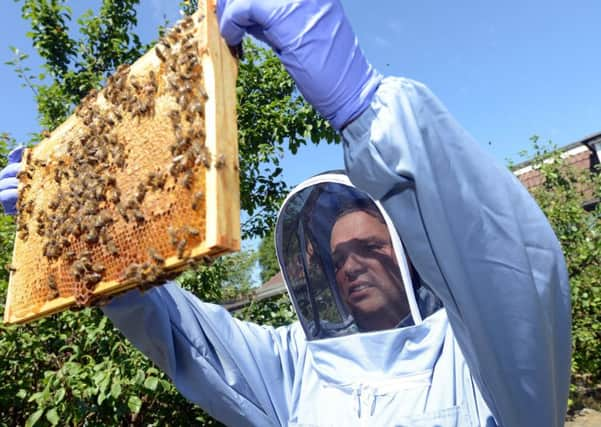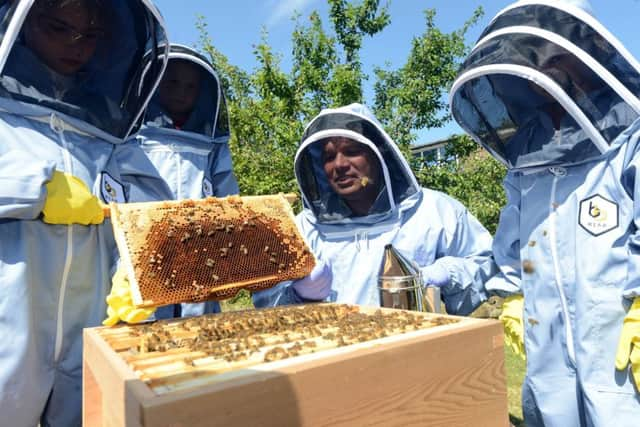Why Silicon Valley tycoon is buzzing about saving bees in Sheffield


There may be more than 5,000 miles between Silicon Valley and Sheffield but a chance event in a Californian vineyard has resulted in an apiary containing more than 10,000 bees being installed in a South Yorkshire school.
A landscaper working at the home of software company boss David Richards last year used pesticides on his vineyard – with fatal consequences for two of the three colonies of bees that Richards had established on his land.
Advertisement
Hide AdAdvertisement
Hide Ad“It caused two colonies to collapse within a couple of weeks,” says Richards.


“When you see tens of thousands of dead bees, it is pretty awful, a horrible sight.”
Richards, who had taken up bee-keeping as a hobby a few years earlier after reading articles about the alarming decline in their population across the world, was inspired to do something about it.
“When my landscaper put the pesticides down, I realised it was a lack of education about the situation,” says Richards, who is the chief executive officer of computing company WANdisco. “I also live next to a country club golf course and it was obvious when they were putting pesticides down as it had an effect.
“I realised we have to solve this problem at the source.
Advertisement
Hide AdAdvertisement
Hide Ad“If we try to get into as many schools as we can, at least then we have a fighting chance of children growing up in an environment where they are used to bees and thinking about they should and shouldn’t do around them.”
Earlier this year, Richards and his wife Jane set up a charitable foundation funded with $1.4m (£1m) of their own money with twin aims – advancing the teaching of computer science and ecology in English state schools and improving environmental protection.
With a computer science course already under way at Tapton School in Sheffield, which he attended as a child, Richards was back in Yorkshire at Wisewood Community Primary School, which is part of the Tapton School Academy Trust, to launch the next element of the foundation’s work – setting up an apiary in the school grounds.
His connection to the school is a piece of fortuitous timing as headteacher Liz Heaphy had already been trying to establish a beehive on the school grounds but was struggling to find the funds to pay for the necessary equipment.
Advertisement
Hide AdAdvertisement
Hide AdOne colony of bees is now in place, with a further two due to be added in the next couple of weeks.
Richards and the school have been working on the project with the Sheffield Beekeepers Association and he hopes the scheme can be rolled out across the local region.
“We are going to try and do it in 10 schools in South Yorkshire in the next 12 months,” he says.
He says he hopes the children get as much out of bee-keeping as he has done.
Advertisement
Hide AdAdvertisement
Hide Ad“There is no better hobby in life than caring for and looking after bees, it is a fantastic hobby. A lot of people are unfortunately scared of them which is normal but they don’t have to be,” he says.
“The more you learn about them, the more you realise just how clever they really are. There are so many different roles inside a bee-hive, you have undertakers, nurses, all sorts. It is almost socialism, actually.”
Richards says one of the great pleasures of the past few years has been seeing how his bees have brought previously-dormant pear and plum trees on his land to life thanks to their role in the pollination process.
Bees and other pollinators are vital to most of the world’s food crops but have been in decline in recent decades due to the destruction of wild habitats, disease and pesticide use, with infectious diseases identified as a key driver of bee population declines. Which is why this project and others like them are so important because they raise awareness and they help get youngsters interested.
Advertisement
Hide AdAdvertisement
Hide AdWisewood headteacher Liz Heaphy says it is hoped that the hives will thrive enough for the children to go on to make their own honey, which they will then sell to help fund the further operation of the project.
“Everyone knows pollinating insects are important but they are not the cuddliest things in the world,” she says. “I wanted our children to have an in-depth understanding of the life cycle of pollinating insects, understand how important they are and how we can improve the local environment to make it more friendly for them.
“There are lots of other benefits for the children like having the opportunity to take care of something and manage its environment.
“There has been quite a lot of research to suggest that children who struggle to manage their behaviour in school often develop a really good aptitude for beekeeping, which you have to be very calm while you are doing it.”
Advertisement
Hide AdAdvertisement
Hide AdShe says the positioning of the hives means children who are slightly nervous of bees will be able to observe and participate from a safe distance if they aren’t immediately sure about hands-on involvement.
Heaphy adds: “Learning how to keep them will help increase their self confidence and understanding of the world in so many different ways. Bees can teach us about the benefits of co-operation, communication, efficiency and organisation.
“They are also producers of beneficial products including honey, pollen, propolis, royal jelly and wax. Our children will learn about running a harvesting business and pick up practical skills in numeracy, production and marketing.”
Children will also learn about beekeeping as part of the science curriculum.
Advertisement
Hide AdAdvertisement
Hide AdThe Sheffield Beekeepers Association has donated the three beehives to Wisewood, while The David and Jane Richards Family Foundation provided funding for the bees and essential items including beekeeping suits for children and adults, smokers, gloves, honey buckets, strainers, jars and tools.
Phil Khorassandjian, chair of Sheffield BKA, says: “For many years, we have wanted to get young people involved in keeping bees. With the support of the foundation, this has become a reality at Wisewood.
“We are very excited about this project and its educational and environmental potential.”
For his part, Richards hopes the scheme can make a positive difference and inspire the launch of similar projects. “The aggressive use of pesticides is decimating the population of bees,” he says.
Advertisement
Hide AdAdvertisement
Hide Ad“We need a healthy bee population for food security, sustainable farming, biodiversity and environmental protection. Our goal is to make more people aware of the threat to their extinction and the devastating effect this would have on the balance of our ecosystem.”
Charity foundation to help state schools
David and Jane Richards hope their charity foundation will improve the lives of children across England.
“Our idea was to give back to the education system we have benefited from,” says Mr Richards.
“We both went to state school in the UK and I was in Sheffield of course.”
Advertisement
Hide AdAdvertisement
Hide AdThe foundation is registered as a charitable incorporated organisation to operate throughout England.
Its trustees include Lord Kerslake, the former head of the civil service and ex-chief executive of Sheffield Council.
Professor Chris Brady, who is director of the Centre for Sports Business at the University of Salford, and Herb Kim, founder and chief executive officer of Thinking Digital, are also trustees.